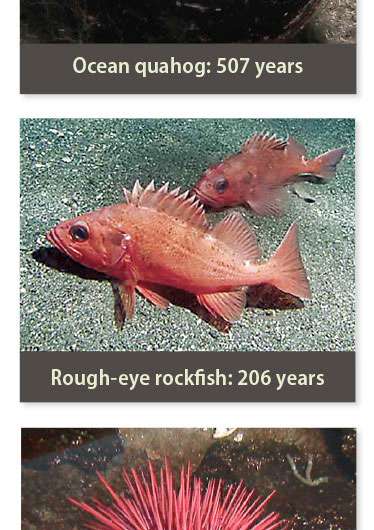Researcher explores the science of aging

The longest-lived human on record didn't make it much past 120 years. That's nothing compared to the ocean quahog, a fist-sized clam found off the coast of Maine. "They can live 500 years or longer," says Steven Austad, Ph.D., chair of the Department of Biology in the UAB College of Arts and Sciences and associate director of the UAB Comprehensive Center for Healthy Aging. "They've been sitting out there on the sea floor since before Shakespeare was born."
Austad's research focuses on understanding the underlying causes of aging at the molecular level. Although his studies take him in many fascinating directions, it's the ancient clams that everyone remembers. "I'm known in the field as the guy who works with weird animals," Austad says.
So what do animals like the quahog know about healthy aging that we don't? That question drives Austad's studies in comparative gerontology, which look to long-lived animals to identify new molecular targets to help humans.
Photos of ocean quahog, rough-eye rockfish, and red sea urchinLive long and prosper: Meet a few of the stars of comparative gerontology, with the maximum reported age for each species. Austad is working on a book called Methuselah's Zoo, which he describes as "a natural history of successful aging." It will include profiles of his favorite 500-year-old clams, but also 200-year-old whales and 40-year-old bats.
Protein power
Clams—technically, bivalve mollusks—live longer than any other animal group; more than a dozen species have lifespans of a century or more. But they are not all masters of aging. Austad's lab is studying mitochondrial function, protein stability and stress resistance across seven species of clams, with lifespans ranging from one year to the ocean quahog's 500-plus years.
Austad's research has convinced him that one key to slowing aging is to protect the proteins inside our cells. "Proteins make everything work in the cell, and to do that, they have to be folded precisely like origami," Austad says. "But as we get older they get battered about, and ultimately lose that precise shape."
That's why Austad is so excited by what he's found in ocean quahogs. "They keep their proteins in shape century after century," he says. When Austad takes human proteins and adds them to a mix of tissues from the clams, "they become more stable, less likely to unfold." His lab is now working to identify exactly what is protecting the clams' proteins. That mechanism could point to a potential treatment for aging, along with new therapies for Alzheimer's disease and other conditions caused by protein misfolding, Austad notes.
Enter the hydra
In addition to clams, Austad studies a tiny freshwater creature called a hydra, which is basically immortal. Or so scientists once thought, until they found one particular species of hydra that begins to age rapidly under the right combination of environmental conditions.
"Under certain conditions, this hydra turns on a symphony of genes that prevent aging; under others, it does not," Austad says. His lab is working to discover the molecular mechanisms that get switched on, or off, as the hydra's environment changes. "These kinds of studies are a way to quickly identify new genes that might be targets for new drugs to keep people healthy longer," Austad says.
He adds that the opportunities for collaborative, translational work in the Comprehensive Center for Healthy Aging, which brings together a wide range of basic and applied scientists from schools across campus, helped draw him to UAB.
Living longer—and better
This is a very exciting time to study aging, says Austad, who is in a position to survey the field as the scientific director for the American Federation for Aging Research. "We're making an incredible amount of progress," he says. "We know a lot of things from animal work that will slow aging by 20 percent, and that's the difference between being healthy for 60 years and being healthy for over 70 years."
Living longer wouldn't be much fun if you got progressively sicker, but "what we're finding is that, if you treat the underlying causes of aging, you can push back cancer, heart disease, blindness, hearing loss—all of these diseases associated with aging," says Austad.
One particularly intriguing lead, being followed by Austad and other researchers worldwide, is the drug rapamycin, which is FDA-approved to prevent rejection after organ transplants. A series of studies, from yeast, worms and mice, have shown that rapamycin can extend lifespan as well.
Rapamycin has "almost miraculous" effects against aging in mice, Austad says. "It prevents cancer, heart disease, Alzheimer's—a whole host of things." His lab is now working to understand how administering rapamycin at different points in an animal's life affects the aging process.
Curb your enthusiasm?
Despite these exciting findings, caution is required, Austad notes. "Nothing I have learned so far has changed my behavior," he says. "I don't take a bunch of pills; I'm not even tempted to take rapamycin at this point." For one reason, rapamycin has several side effects in mouse studies, including an elevated incidence of cataracts, loss of glucose sensitivity and testicular atrophy. Austad believes that the right dosing and formulation could overcome these issues in humans, but "we still don't know what the best dose is," he says.
At the moment, the best advice about healthy aging "is still the boring stuff your mother already told you," Austad says. "'Eat the right foods; don't eat too much; exercise.' But come back in 10 years and it will be a different answer."



















